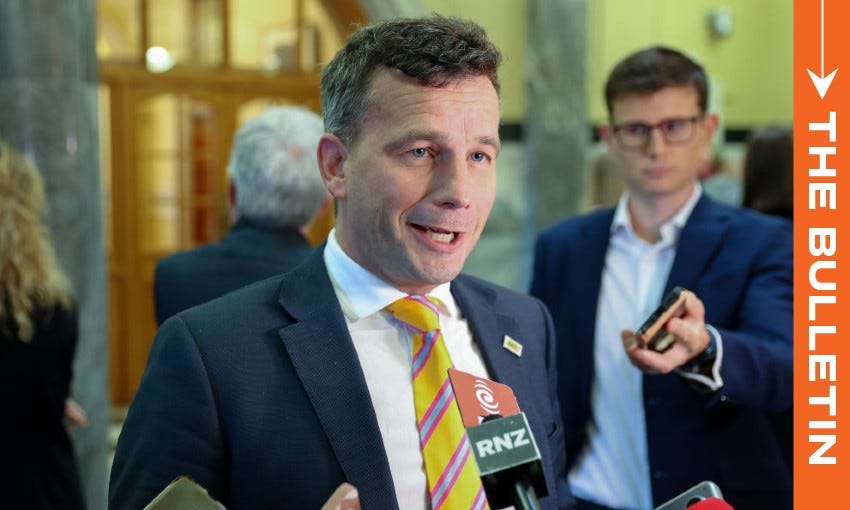Who regulates the Ministry of Regulation?
The latest headlines on the fledgling ministry have prompted the opposition to call David Seymour a hypocrite.
Mōrena, and welcome to The Bulletin for Friday, August 23.
In today’s edition: Has Christopher Luxon officially abandoned “localism”? Plus: can Health NZ find $1.4bn in savings without touching the frontline, and Winston Peters expected to contest 2026 election (according to his faithful deputy). First, unpacking the recent headlines about the Ministry of Regulation.
How much?!
Unless you’re glued to what’s going on in politics, you could easily be forgiven for not knowing that we have a Ministry of Regulation. To be fair, it is fairly new – Anna Rawhiti-Connell wrote about its launch for The Bulletin just a few months ago. Since then, the new ministry has been bubbling away in the background as it gets about with its job of regulating regulation. More on that in a moment, but first, there have been a flurry of headlines this week that have little to do with the ministry’s actual work, but more about its operation.
Andrea Vance at The Post reported on Wednesday that despite rising from the ashes of a high profile public sector jobs cull that saw thousands of roles ditched in the name of cost saving, the Ministry of Regulation has quite a few high paying roles. The average salary of its staff is over $150,000. Last week, Vance also reported that the new ministry was hiring a “principal adviser, engagement and communications” – or in Vance’s words, a “spin doctor” – that would be paid almost $170,000.
How we ended up with a red tape ministry
Seymour, who is the minister for regulation, proposed the new ministry as the flagship policy at his party’s election campaign launch last June. At the time, reported the Herald’s Adam Pearse, he said it would involve policing “the rules and regulations ministers are constantly foisting on unsuspecting Kiwis just trying to get ahead”. It ultimately became a coalition policy and the ministry launched in March, with Seymour telling Newsroom’s Emma Hatton that it would operate a bit like Treasury does for government spending.
We have been here before, sort of. Former Act leader Rodney Hide was the ministry for regulatory reform under John Key and as this piece in The Conversation explained last year, Act has consistently pushed for a more embedded approach to regulation dating back to its launch (and even earlier, if you consider Rogernomics). A few weeks back, reported Dan Brunskill at Interest, Seymour expressed his view that the ministry could become as important as the independent Reserve Bank and the Public Finance Act, acting as a third pillar in our country’s economic governance.
‘Hypocrite’
The opposition has appeared relatively indifferent to the ministry since its launch, but has taken severe issue with the reports of high-spending staff. Labour leader Chris Hipkins said that having a “ridiculously large number of people being employed on over $150,000 a year when other public servants are being laid off shows what a hypocrite David Seymour is”, reported RNZ’s Craig McCulloch. The Spinoff’s Lyric Waiwiri-Smith reported recently that close to 6,500 public sector positions have been – or are proposed to be – disestablished.
Green MP Francisco Hernandez, who wrote the parliamentary questions that exposed the salaries in the first place, wryly asked in parliament yesterday whether staffing the new ministry was a “must-have” in comparison to the “nice to have” public servants who had lost their jobs (Nicola Willis called that inference “objectionable”). The Taxpayers’ Union, a lobby group that tends to align with the cost-cutting mentality of the current government, suggested Seymour should be leading by example in “taking on the bureaucratic blob”.
Meanwhile, as an aside, The Spinoff’s Toby Manhire raised an interesting point on the latest episode of Gone by Lunchtime. While Seymour often advocates for cutting down on government waste, he is also overseeing a piece of legislation – the Treaty Principles Bill – that as we’ve talked about this week is doomed to fail. As Manhire argued, that seems “fairly wasteful”.
Where to from here
David Seymour himself has pushed back on concerns over his new ministry, 1News reported, questioning the media’s focus on it. There were more than 200 people in the public service earning between $250,000 and $350,000, he said, and the Ministry of Regulation was “destined to be a lean and effective team”. As The Post noted here, the new ministry will have 91 staff – more than four times the size of the Productivity Commission it replaced.
There are a number of developments on the horizon in the area of regulation. For one, the ministry has two regulatory reviews ongoing – one into the early childhood sector and another into agricultural and horticultural products (with more on the way). More importantly, there is a piece of legislation – the Regulatory Standards Act – that has yet to be passed but was also a feature of the National-Act coalition agreement. The last iteration of this bill was proposed by Seymour and backed by National in 2021 but failed due to Labour’s majority. That won’t be the case this time.
Show your support, join up today!
"As a New Zealander living in Sydney, The Spinoff helps me to feel in touch with what's happening back home. There's a great breadth to the content – and the enthusiasm from your contributors is palpable. I feel happy and proud to be a member." Ian, Sydney.
Whether living here or abroad, if you value our work please show your support by becoming a member today.
Further RMA reforms on the way, Bishop signals softening of heritage rules
The government has announced a proposed second amendment to the Resource Management Act as it continues its shake up of the country’s planning laws, RNZ’s Lillian Hanly reports. This new amendment would enable projects to "drive economic growth and productivity", said the minister responsible Chris Bishop, and focus on areas like infrastructure, housing and farming. The government has already repealed Labour’s RMA replacement laws and plans to introduce its own substantive overhaul. We talked earlier this week about the debate over heritage buildings, and as The Post’s Tom Hunt reported, Bishop has teased plans to soften the rules in this area.
Meanwhile, the prime minister’s challenge to councils that we discussed yesterday has continued to provoke commentary. The government signalled it may cap rate increases in order to stop so-called “nice to have” projects being ordered by local government. As BusinessDesk’s Jem Traylen reported (paywalled), local government representatives have urged caution. And writing for The Spinoff today, Joel MacManus has gone a step further, arguing it proves the government has ditched its support of “localism” that it championed in the election campaign.
Analysis: Finding Health NZ $1.4bn likely to see frontline cuts
New analysis suggests Health NZ has routinely been underfunded by successive governments and plans to find an extra $1.4bn will likely require cuts to the frontline. The Herald’s Isaac Davison has reported that, according to four researchers from the Association of Salaried Medical Specialists, underfunding of the health system was to blame for “increasing waiting lists, longer waits for treatment and ageing facilities and equipment”. The experts argued that most of the budget boost given to health will be eaten up by capital spending and that it was “difficult to see how a further $1.4bn of savings will be found without impacting frontline services”. As we’ve talked about on several occasions, the government and Health NZ have argued that core services won’t be affected, and new commissioner Lester Levy last week pushed back strongly on an internal proposal to make wide-ranging cuts to staff numbers.
Listen: The lights have switched off at the Consumer Advocacy Council
In 2018, The Consumer Advocacy Council was set up by cabinet in response to a commissioned investigation into the nation’s problematic electricity market. It was designed to act as an independent advocate for residential and small business electricity consumers in Aotearoa. Then came Budget 2024. With the stroke of a pen, the council was scrapped by the coalition government to help balance the books.
Former chair Deborah Hart speaks to Bernard Hickey about what the loss of the council means for everyday consumers, what’s wrong with our electricity industry and how we can improve things in the future.
Click and Collect
More on the response to the government’s attack on councils, with Newsroom’s Jonathan Milne suggesting it’s part of a tactic to divert criticism towards local government instead.
The government wants councils to stop wasting money on “nice to haves”, but yesterday announced it was offering up $750,000 to bring the World Dance Crew Championship to Auckland next year.
As we touched on yesterday, “regional deals” are on the way. Five regions will first be invited to put forward high-level proposals, reported The Post’s Thomas Manch.
Leon MacDonald will not continue his role as All Blacks assistant coach. Gregor Paul argues that the “surprise” was less that MacDonald’s resigned and more in the timing of the announcement. (paywalled)
Luxon heads into Pacific’s “perfect storm”. (Newsroom Pro, paywalled)
Last year was the first time in more than 20 years that the number of cafés and restaurants in New Zealand shrank compared to the year before.
Get ready for more of The Traitors. The BBC has confirmed a fourth series has been commissioned (series three has already been filmed) while a new celebrity version is on the way for 2024. I am 100% faithful and I cannot wait.
Hera Lindsay Bird ranks the months of the year from worst to best. Andrew Geddis asks whether Darleen Tana's party-hopping legal argument stacks up. Alex Casey discovers how We Were Dangerous pulled off its incredible balancing act. Liam Rātana notes the The Treaty Principles Bill isn't dead yet. Hera Lindsay Bird advises a reader wondering whether men always have to pay for dates.
That’s it for this week, thanks for reading. See you back here on Monday morning.
Want to get in touch? Join the conversation in the Substack comments section or via email at thebulletin@thespinoff.co.nz if you have any feedback on today’s top stories (or anything else in the news).
If you liked what you read today, share The Bulletin with friends, family and colleagues.















sounds like a line from 1984
Can't help but think of Terry Gilliam's film Brazil and its 'Central Services'
"Mr. Helpmann: I understand this concern on behalf of the tax payers. People want value for money. That's why we always insist on the principle of Information Retrieval charges. It's absolutely right and fair that those found guilty should pay for their periods of detention and for the Information Retrieval Procedures used in their interrogation."
Source: https://en.wikiquote.org/wiki/Brazil_(1985_film)